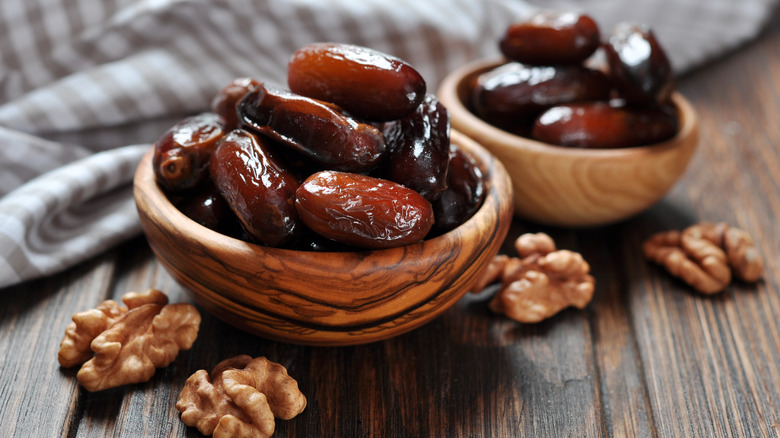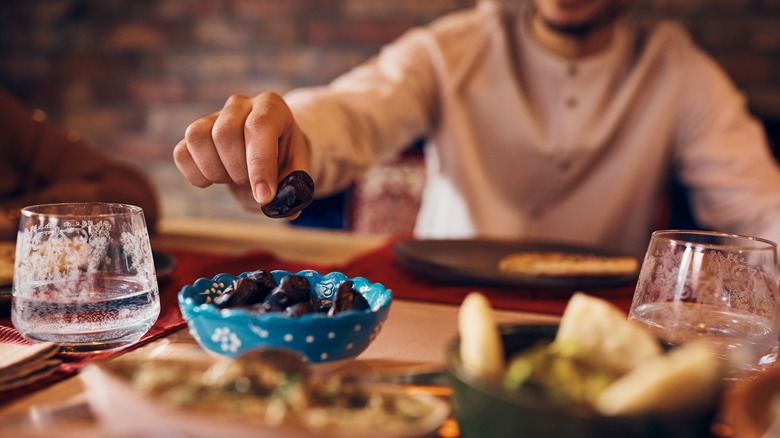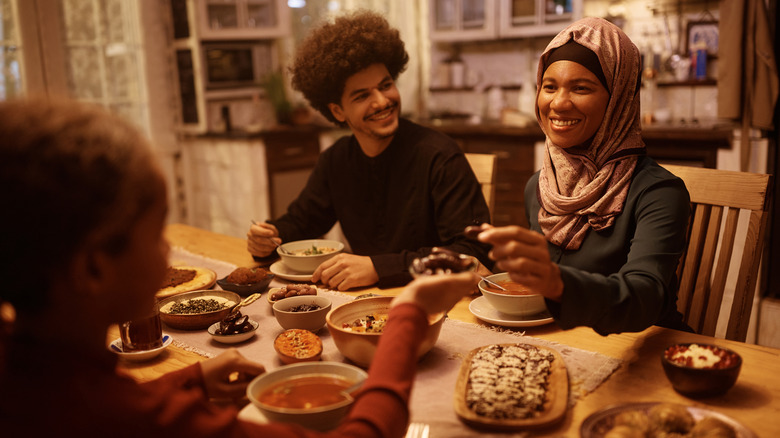Why Eating Dates Is The Traditional Food-Related Way For Some To End Ramadan Fasting
Ramadan is an important holiday for people all over the world who adhere to the Islamic faith. It begins on the ninth month of the Islamic lunar calendar and lasts until Eid al-Fitr, which is expected to fall on April 21. The actual dates of both Ramadan and Eid al-Fitr vary according to differences among cultures and family traditions. Along with worship and community involvement, fasting is a major practice of Ramadan. As a result, Muslims are expected to abstain from food and drink from sunrise to sunset during the 29 to 30 days of the holiday.
Many religious faiths use fasting as a means of getting closer to their higher spirit or power, and Islam is no exception. Fasting is also a way to exhibit self-discipline, a highly valuable characteristic among those who observe the religion. Fasting is so vital to the Islamic faith that it's included in the Five Pillars of Islam, along with the profession of faith, prayer, giving alms, and pilgrimage to Mecca. After sundown on Ramadan, Muslims break their fast over iftar, a celebratory meal shared between friends and loved ones. And many Muslims break their fasts by eating a specific food, a tradition that was taken straight from the Quran.
A food tradition with divine inspiration
It should be said that Ramadan traditions vary from place to place, and even from family to family. These traditions are often quite personal and may be passed down through the generations, which means that not every Muslim will take the same exact approach when it comes to things like breaking fasts. However, there is one food tradition that many Muslims observe during Ramadan, one that was encouraged by the Prophet Mohammed, the spiritual leader and founder of Islam.
During iftar, many Muslims around the globe will break their fast by eating three dates. This tradition arises from Prophet Mohammed's own practices, as it's said that he chose to break his own fast by eating three dates and drinking water. It makes sense that dates would be culturally important to Muslims, as the Middle East offers an ideal climate for growing dates thanks to the high temperatures. And outside of their cultural importance, dates are also an ideal food thanks to their nutritional benefits.
Dates make a healthy post-fasting snack
After a fast, the body can be depleted of nutrients and minerals, and become dehydrated, which is why dates make a great post-fasting snack. Along with their pleasing sweetness, dates are known for containing many essential nutrients. Included among them is an impressive portion of fiber, as a 3.5-ounce serving can include up to 7 grams. Fiber is essential for good digestion, but it can also regulate blood sugar. For instance, upping your fiber intake will reduce the rate of digestion, which in turn stops blood glucose levels from becoming elevated after meals. You'll also find essential minerals packed into dates such as magnesium, potassium, and iron.
They are also rich in antioxidants, which are associated with a reduced disease risk thanks to their ability to fend off free radical damage. In particular, dates contain three types of beneficial antioxidants known for their powerful health effects. These antioxidants are believed to lower the risk of diseases like diabetes and cancer, while also supporting optimum heart health.
Based on these facts, and for the sake of following tradition, it's easy to see why dates are a common component of iftar feasts for so many Muslims.


